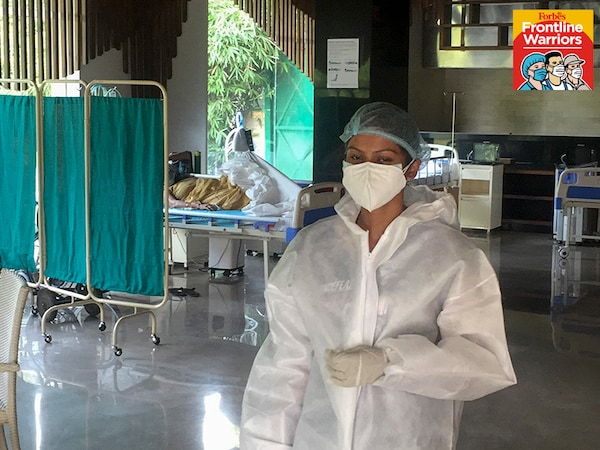International Nurses Day: Nursing elderly Covid-19 patients, and healing them to
Reena Razia, who heads the nursing department at a Covid-19 care facility in Gurugram, provides senior citizens with medical as well as emotional care


For four months, Reena Razia has been away from her family. A single parent, Razia has left behind her two daughters, aged 11 and 9, with her mother in Uttar Pradesh’s Gajraula to work as a senior nurse looking after Covid-19 patients. Once her work for the day is done, the 41-year-old stays back at her current workplace, the Golden Tulip Hotel in Gurugram’s Sector 29 that has been converted into a Covid-19 care facility for senior citizens. But it is also in this confinement that Razia has fostered a new family—of the elderly, lonely and ailing, “many of whom just want their hands to be held".
“Covid is a lonely disease, especially for senior citizens. Those who are admitted here need emotional support, besides medical care," says Razia, the nursing head of the department of the facility. “We nurses make it a point to speak to them every day and assuage their fears. We are here for our patients and will never let them feel depressed."
Razia’s day begins at 8 in the morning, with allocating nursing staff to patients, usually one per six. In the next eight hours as she holds shift, she has to check on each patient, address their queries (from the type of food that they need to whether they are being administered medicines), monitor the functioning of each machine (be it a bipap or an oxygen concentrator), check stock and call for refilling when supplies are depleted. Or, if someone’s health parameters call for attention, she coordinates with the team at the facility and the patient’s family to have them transferred to a hospital for critical care. She does get one meal break amidst this, which is also her only opportunity to ditch the PPE suit for a while.
“As any health care professional will tell you, wearing a PPE for hours, especially in summers, isn’t easy. You sweat, you get dehydrated, but you can’t drink water through it, or go to the bathroom," she says. Once her lunch is over though, Razia has to slip back into a fresh suit. “Protection is also necessary. We wear head caps, shoe covers, double masks, double gloves. We can’t afford to fall ill. If we don’t come to work, who will look after these patients?"
Besides her long to-do list, Razia, along with the team at the facility, also tries to give patients a feel of home. A few days ago, draped in PPE suits, they walked into the room of a 60-year-old lady with a birthday cake, after being tipped off by the patient’s brother. “The smile on her face was something else," she says.
Razia has been handling Covid-19 patients for a year now, and isn’t scared of the disease anymore. A year ago, when the pandemic broke, she was working at a medical college in Noida. “We were briefed about this infectious disease and asked which of us would opt to work with such patients. I was the first one to raise my hand," she says. “Even then, I was a little scared to begin with. Now we’ve learnt to live with it."
Razia’s younger daughter often goads her mother to return. “If you’re tired of the PPE kit, just drop it and come back home, she tells me," laughs Razia, who lost her husband in 2016. “But I’ve had to explain it to them that now that papa is no more, I will have to continue to work. The young one wants to grow up to be a doctor, so I tell her that I will work so she can keep chasing her dream."
Patients recovering under her watch are Razia’s biggest impetus to carry on. For her, there is no better feeling than to see a patient being discharged. “Goodbyes are the best thing to happen to us," she says.
First Published: May 12, 2021, 10:01
Subscribe Now